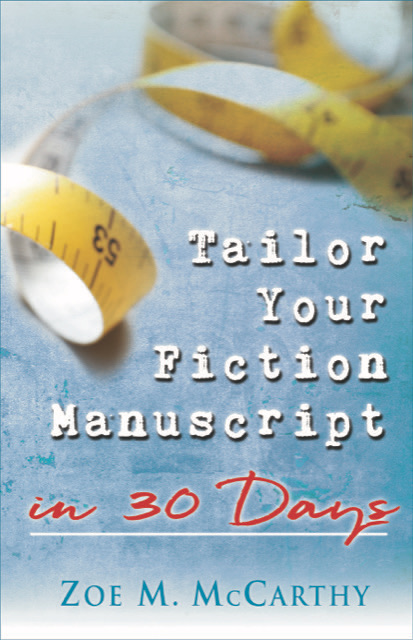
Zoe’s book, Tailor Your Fiction Manuscript in 30 Days, is a fresh and innovative refocusing of your novel or novella. Through a few simple—and fun—steps, Zoe helps writers take their not-ready-for-publication and/or rejected manuscripts to a spit-polish finish. Writing is hard work, yes, but it doesn’t have to be difficult. —Eva Marie Everson, best-selling and multiple award-winning author, conference director, president of Word Weavers International, Inc.
See the end of this post for more information.
Watch out for these four wordy expressions using the verb go. Use your search-and-find option to uncover these phrases in you story and revise the sentences.
1. “[Am, Was, Were] Going To”
Example 1
Diana didn’t know how she was going to tell Paul she’d lost her car keys.
Better:
> Diana didn’t how to tell Paul she’d lost her car keys.

Example 2
He was going to hit a home run in the next inning.
Better:
> He would hit a home run in the next inning.
> He’d hit a home run in the next inning.
Example 3
I am going to go find Mark before it’s too late.
Possibilities:
> I’ll search for Mark before it’s too late.
Be careful. This may not mean quite the same thing as the original, which implies she’ll search until she finds Mark.
> I’ll find Mark before it’s too late.
This also may not express the original meaning. It could mean she’s sure she’ll find Mark before it’s too late.
> I’ll drive the Mustang around the city and find Mark before it’s too late.
2. “Go Get”

Steve headed for the door. “I’ll go get the boat.”
Possibilities:
> Steve headed for the door. “I’ll retrieve the boat.”
For a guy who says, “go get,” retrieve sounds too formal.
> Steve headed for the door. “I’ll get the boat.”
This is less wordy and sounds like something Steve would say. It’s more important for dialogue to reflect the character’s personality than to be a stronger word.
If “go get” was written in a narrative, (He went and got the boat.) retrieve might work better. (He retrieved the boat.)
3. “Was Gone”
Example 1
Cam said his good-byes and was gone.
Better:
> Cam said his good-byes and left.
Example 2

Petra’s eyelids closed, and he was gone.*
For death, “was gone” softens the event, but if you want the sentence to be less wordy and the reader to experience the harsh reality, use died.
Possibilities
> Petra’s eyelids closed, and he died.*
> Petra’s eyelids closed and he died.*
Omitting the comma on such a short sentence is acceptable and may make the death sound more immediate.
Better:
> Petra closed his eyes and died.*
I prefer this concise option.
4. “Was Going”
Example 1
Jess was going around the curve too fast.
“Was going” can work if the story is written in past tense and the writer wants the action to reflect what’s happening now.
Other Possibilities:
> Jess went around the curve too fast.
> Jess steered into the curve too fast.
> Jess approached the curve too fast.
These sentences have slightly different meanings.
Example 2
Bill was going for the rest of the supplies.
Other Possibilities:
> Bill went for the rest of the supplies.
> Bill had gone for the rest of the supplies.
> Bill left to collect the rest of the supplies.
Here “was going” is vague. Depending on the meaning, the other possibilities are better.
What other problems have you seen in writers using the verb go?
*The camel is actually asleep.



 RSS - Posts
RSS - Posts



Great examples with helpful revisions. Thanks for sharing your wealth of knowledge.
You’re welcome, Kim.
Hi Zoe. Reminds me of one of my downfalls, which is “started to”. Mary started to do the laundry. Did she start and then suddenly stop in the middle of the chore? Unlikely! Thanks for this insight into the word “go”.
Hi Patricia, I’m so glad you mentioned started to. When I first started to write I was guilty of using that a lot. :0)